IRA Investing
Is Bitcoin ETF Worth It?
Open the door to potential gains with Bitcoin ETFs, but tread carefully to navigate the risks and rewards ahead.

Considering the potential benefits and drawbacks, investing in a Bitcoin ETF can be worth it for those seeking exposure to Bitcoin's price movements through a regulated and accessible investment option. While ETFs offer streamlined access and easier monitoring, they come with higher fees and lack direct ownership over Bitcoin assets. Understanding tax implications, regulatory impacts, and adopting suitable investment strategies are vital for making informed decisions. For a diversified retirement portfolio, weighing these factors is essential to assess if a Bitcoin ETF aligns with individual goals and risk tolerance. Further exploration of these aspects can provide deeper insights into the viability of Bitcoin ETF investments.
Key Takeaways
- Provides regulated exposure to Bitcoin's price.
- Simplified investment option.
- Trading on major exchanges.
- Higher fees compared to direct ownership.
- Limited access to broader crypto ecosystem.
Pros of Bitcoin ETFs

Offering a streamlined avenue for investors to gain exposure to Bitcoin's price fluctuations, Bitcoin ETFs present an efficient and regulated investment option. These ETFs, which track the price of Bitcoin, allow investors to participate in the digital asset market without directly owning the cryptocurrency.
With SEC approval, Bitcoin ETFs adhere to regulatory oversight, providing investors with a level of protection not always present in the cryptocurrency space. By trading on major exchanges like CBOE, NASDAQ, and NYSE, Bitcoin ETFs offer liquidity, making it easier for investors to buy and sell shares.
Additionally, investing in Bitcoin ETFs can provide a structured investment approach, allowing investors to diversify their portfolios with a digital asset that has seen significant market interest. While Bitcoin ETFs do not eliminate the volatility associated with Bitcoin's price, they offer a more secure and regulated way for investors to access this market.
Cons of Bitcoin ETFs

Despite the perceived importance and regulation of Bitcoin ETFs, there are several drawbacks that potential investors should carefully consider before investing in these financial products.
One significant concern is the higher fees associated with Bitcoin ETFs compared to direct ownership of Bitcoin. These fees can eat into potential returns over time.
Additionally, investors do not have direct ownership or control over the actual Bitcoin assets when investing in an ETF, which can be a deterrent for those seeking full control over their investments.
Another drawback is the limited access to the broader decentralized ecosystem and reduced diversification that comes with holding Bitcoin through an ETF.
Moreover, by opting for an ETF, individuals may forfeit the tax benefits and advantages that come with self-sovereignty and direct ownership of Bitcoin.
It's important for investors to weigh these limitations against the perceived conveniences of ETFs before making investment decisions in the cryptocurrency space.
Performance Tracking of Bitcoin ETFs

Bitcoin ETFs provide investors with a straightforward method to monitor the performance of Bitcoin through their close tracking of its price movements. Spot Bitcoin ETFs, such as the iShares Bitcoin Trust and Fidelity Wise Origin Bitcoin Fund, offer direct exposure to the digital asset's price fluctuations, mimicking its trajectory effectively.
These ETFs serve as a convenient way for investors to gain exposure to Bitcoin's price movement, allowing for a comparison between Bitcoin price increases and ETF performance to gauge the effectiveness of these investment vehicles. Investing in spot Bitcoin ETFs can be particularly suitable for long-term holders seeking to benefit from Bitcoin's price appreciation with ease.
Tax Implications of Bitcoin ETFs
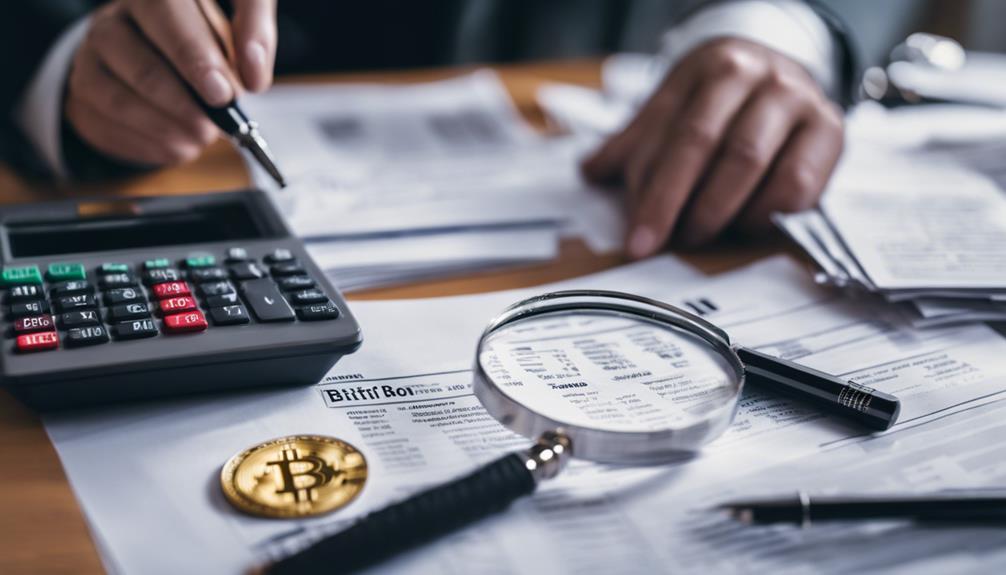
Tax implications associated with investing in Bitcoin ETFs should be carefully considered by investors to understand the potential impact on their financial returns. When it comes to Bitcoin ETFs, investors should be aware of the following:
- Capital gains tax may be incurred when selling ETF shares for a profit.
- The tax rates applied depend on the holding period of the ETF shares, with short-term rates applicable for holdings of less than a year.
- Seeking advice from a tax professional is essential to gain a thorough understanding of the specific tax implications related to investing in Bitcoin ETFs.
Given the evolving nature of the crypto market and the complexities surrounding tax regulations, consulting with a tax professional can help investors navigate the nuances of tax implications effectively.
Understanding the tax implications of Bitcoin ETF investments is essential for making informed decisions and optimizing returns while ensuring compliance with relevant tax laws.
Regulatory Impact on Bitcoin ETFs

Understanding regulatory obstacles is a vital aspect of comprehending the impact on Bitcoin ETFs.
The SEC approval process for Bitcoin ETFs plays a significant role in determining their availability to investors.
It is essential to grasp the regulatory landscape surrounding these investment vehicles to make informed decisions regarding their potential benefits and risks.
Regulatory Hurdles for ETFS
Despite the SEC's approval of spot Bitcoin ETFs in January 2024, regulatory concerns surrounding market manipulation and compliance continue to pose significant hurdles for the widespread acceptance and implementation of these investment vehicles. Spot Bitcoin ETFs offer direct access to the cryptocurrency market but face challenges such as:
- Demonstrating effective measures to prevent market manipulation.
- Ensuring compliance with existing financial regulations.
- Monitoring the impact of Bitcoin ETF adoption trends on the overall cryptocurrency market.
These hurdles highlight the need for thorough regulatory oversight and proactive measures to address potential risks associated with spot Bitcoin ETFs, ultimately shaping their future viability in the investment landscape.
SEC Approval Process
The SEC's meticulous evaluation process for approving spot Bitcoin ETFs underscores the regulatory impact on these investment products within the evolving cryptocurrency market landscape. The regulatory approval of spot Bitcoin ETFs has bolstered investor confidence, enabling easier access to Bitcoin exposure through highly liquid products that trade like stocks. Before spot Bitcoin ETFs, investors could only access Bitcoin indirectly through Bitcoin strategy ETFs investing in futures or mining stocks. The SEC's cautious approach is driven by concerns about market manipulation, investor protection, and ensuring regulatory compliance. This careful scrutiny aims to safeguard investors and the integrity of the cryptocurrency market. Below is a table highlighting key aspects of the SEC approval process for Bitcoin ETFs:
| SEC Approval Process | Regulatory Impact | Investor Confidence |
|---|---|---|
| Meticulous evaluation | Increased confidence | Protection assurance |
Investment Strategies for Bitcoin ETFs

When considering investment strategies for Bitcoin ETFs, it is essential to focus on:
- ETF selection criteria
- Risk management strategies
Investors should assess their risk tolerance and long-term goals to align with the appropriate ETF that suits their financial objectives.
Understanding these strategies can help investors navigate the complexities of the crypto market and make informed decisions for their portfolios.
ETF Selection Criteria
When evaluating investment strategies for Bitcoin ETF selection, one must carefully consider key criteria such as ETF fees, promotional offers, alignment with investment goals, holdings composition, and liquidity.
- ETF Fees: Compare fees ranging from 0.19% to 1.50% to optimize cost-effectiveness.
- Promotional Offers: Look for fee waivers for initial periods to maximize potential savings.
- Investment Strategy Alignment: Assess if the fund aligns with your goals, whether it's direct Bitcoin exposure or indirect through futures or mining stocks.
Risk Management Strategies
To effectively navigate the volatile nature of Bitcoin ETF investments, employing robust risk management strategies is essential for safeguarding one's portfolio against potential downturns. Implementing stop-loss orders can help manage risk, while dollar-cost averaging can mitigate the impact of market volatility. Hedging with options or futures contracts provides downside protection, and utilizing asset allocation strategies aids in diversifying risk. Regularly reviewing and adjusting these strategies is vital for maintaining a balanced and protected investment approach with Bitcoin ETFs.
| Risk Management Strategies | Description | Benefit |
|---|---|---|
| Stop-Loss Orders | Set predetermined sell points | Minimize losses during market downturns |
| Dollar-Cost Averaging | Investing fixed amount regularly | Reduce impact of price fluctuations |
| Hedging with Options | Use options for downside protection | Guard against adverse market movements |
| Asset Allocation Strategies | Diversify investments across assets | Spread risk and enhance portfolio stability |
| Regular Review and Adjustment | Periodically assess and modify | Ensure strategies align with current market conditions |
Comparison: Bitcoin ETFS Vs. Direct Ownership

Direct ownership of Bitcoin offers superior diversification and broader access to the decentralized ecosystem compared to investing in Bitcoin ETFs. When considering the benefits and drawbacks of each investment option, it is essential to weigh the following factors:
- Tax Harvesting Benefits: Direct ownership of Bitcoin allows investors to take advantage of tax harvesting strategies, potentially reducing their tax liabilities, which is not possible with Bitcoin ETFs.
- Self-Sovereignty: Holding Bitcoin directly provides full control and ownership of the assets, ensuring self-sovereignty, unlike holding Bitcoin through an ETF where control is with the fund manager.
- Regulatory Concerns: Direct ownership of Bitcoin may be preferable for those concerned about regulatory issues, as ETFs are subject to regulatory changes and oversight that could impact their value.
Considerations Before Investing in Bitcoin ETFs

Before delving into investing in Bitcoin ETFs, it is important to carefully consider several key factors to make informed decisions regarding this investment opportunity.
Regulatory oversight and investor protection are vital aspects to contemplate when thinking about Bitcoin ETFs. These ETFs offer indirect exposure to Bitcoin's price movements through exchange-traded funds, but they also come with risks. It is important to note that ETFs provide SIPC insurance up to $500,000 for investor protection, which can offer a level of security.
However, Bitcoin ETFs are speculative investments and may not be suitable for all investors, particularly those who are risk-averse. These ETFs are subject to regulatory approval by institutions like the SEC before they can be traded on established exchanges such as CBOE, NASDAQ, and NYSE.
Therefore, crypto investors should conduct thorough research and carefully assess their risk tolerance before deciding to invest in Bitcoin ETFs like Fidelity Wise Origin Bitcoin.
Frequently Asked Questions
Is the Bitcoin ETF a Good Investment?
Investing in a Bitcoin ETF can be a strategic move for those considering exposure to the cryptocurrency market. With regulatory oversight, liquidity, and accessibility on major exchanges, Bitcoin ETFs offer a convenient way to include Bitcoin in a diversified portfolio.
However, careful consideration of financial goals, risk tolerance, and time horizon is essential to determine the suitability of such an investment. Seek professional advice and conduct thorough research before making any investment decisions.
What Is the Disadvantage of Bitcoin Etf?
A key disadvantage of Bitcoin ETFs lies in the lack of direct ownership of the underlying asset. Investors forgo possessing Bitcoin when opting for ETFs, potentially missing out on the benefits of holding the actual cryptocurrency.
This indirect exposure may limit control over the investment and hinder the ability to fully capitalize on the potential gains or losses in the crypto market. It is essential to weigh this drawback against the convenience and diversification benefits offered by ETFs.
Which Bitcoin ETF Is Most Successful?
Among the various Bitcoin ETFs, the VanEck Bitcoin Trust (HODL) is considered one of the most successful options.
With a competitive fee of 0.20%, it offers investors exposure to Bitcoin while maintaining a relatively low cost.
Its consistent performance and popularity in the market make it a top choice for those seeking to invest in Bitcoin through an ETF.
Does Bitcoin ETF Affect Bitcoin Price?
The impact of Bitcoin ETFs on the price of Bitcoin is a subject of ongoing debate in the financial world.
Some argue that the introduction of Bitcoin ETFs can lead to increased demand for Bitcoin, potentially driving up its price.
Others believe that the effect may be minimal, as ETF trading does not involve direct purchase or ownership of the underlying asset.
Ultimately, the relationship between Bitcoin ETFs and the price of Bitcoin remains a complex and nuanced issue.
Conclusion
To sum up, evaluating the merits of investing in Bitcoin ETFs can provide benefits like diversification and trading convenience, yet it is essential to also take into account risks such as regulatory uncertainty and tax implications.
It is crucial for investors to carefully assess these aspects and contemplate their investment objectives before determining whether Bitcoin ETFs are a suitable option.
For instance, a hypothetical scenario might involve an investor who prioritizes ease of use and is open to embracing the potential volatility of Bitcoin ETFs in return for simplified entry into the cryptocurrency market.
Albert brings a wealth of knowledge and expertise to our writing team. With a background in caregiving and a deep understanding of the challenges faced by caregivers, Albert’s writing resonates with authenticity and empathy. He is committed to delivering high-quality content that empowers and supports caregivers on their journey.
IRA Investing
Pros and Cons of Investing in a Bitcoin IRA
Leverage the potential benefits and pitfalls of a Bitcoin IRA to make informed decisions for your retirement portfolio.

Investing in a Bitcoin IRA provides diversification beyond typical investments, potentially enhancing returns and shielding from capital gains taxes. Its growth potential and tax advantages can boost long-term financial security. However, risks include market volatility, fees, and regulatory uncertainties that may affect retirement savings. Carefully analyzing fees and suitability is essential. Overall, Bitcoin IRAs offer a mix of advantages and risks that can impact retirement planning greatly. Consider all factors to align with your investment goals and strategy for a secure financial future. Explore the opportunities and drawbacks to make informed decisions about your retirement investments.
Key Takeaways
- Tax benefits shield capital gains in Bitcoin IRAs.
- Diversification beyond traditional assets reduces risk exposure.
- Market volatility can impact retirement savings in Bitcoin IRAs.
- High fees for setup, maintenance, and trading affect potential gains.
- Regulatory uncertainty poses challenges for Bitcoin IRA investors.
Advantages of Bitcoin IRAs

Investing in a Bitcoin IRA offers a host of strategic advantages that can bolster financial portfolios and retirement planning. By utilizing a self-directed IRA to hold digital assets like Bitcoin, investors can benefit from diversification beyond traditional securities. This diversification can help spread risk and potentially enhance returns over the long term.
One key advantage is the tax benefits associated with Bitcoin IRAs. Investors can avoid capital gains taxes by conducting buy and sell transactions within the IRA, allowing for more efficient growth of assets. Additionally, holding Bitcoin within an IRA provides a level of protection against market volatility, safeguarding retirement savings from sudden price swings.
The compounding growth potential within a Bitcoin IRA is also significant, as the tax advantages can lead to enhanced long-term financial outcomes. Overall, investing in a Bitcoin IRA can offer unique advantages for those looking to secure their financial future through strategic and tax-efficient investment decisions.
Potential Growth Opportunities

Given the potential for significant growth opportunities within Bitcoin IRAs, investors can tap into the high growth potential of the cryptocurrency market and potentially outperform traditional assets. Here are three key points to ponder when exploring potential growth opportunities:
- Historical Performance: Bitcoin IRAs offer the chance to benefit from the historical performance of Bitcoin as a digital asset. The value of Bitcoin has shown remarkable growth over the years, making it an appealing option for retirement savings within a Bitcoin IRA.
- Financial Diversification: Investing in a Bitcoin IRA allows for diversification of funds into digital assets, providing exposure to the high growth potential of the cryptocurrency market. By diversifying retirement savings beyond traditional assets, investors can potentially enhance their overall portfolio performance.
- Future Growth Prospects: With a Bitcoin IRA, investors can capitalize on the long-term growth prospects of Bitcoin in the financial market. The increasing adoption and acceptance of Bitcoin offer the opportunity for exponential growth in retirement savings, positioning Bitcoin IRAs as a potential avenue for significant wealth accumulation.
Tax Benefits and Advantages
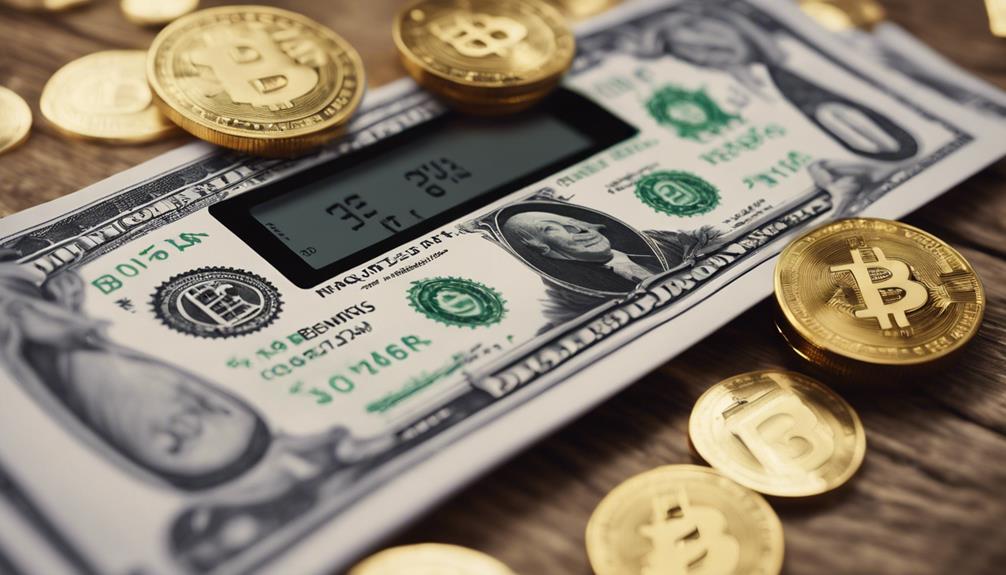
Bitcoin IRAs offer a variety of tax benefits and advantages that can greatly impact investors' long-term financial strategies. Investing in a Cryptocurrency IRA can provide tax advantages by shielding capital gains from taxation.
Roth Bitcoin IRAs specifically offer tax-free withdrawals in retirement, enhancing long-term savings benefits. Additionally, utilizing a Bitcoin IRA allows for staking opportunities, enabling investors to earn interest without tax concerns.
These tax benefits mirror those of traditional Roth IRAs, optimizing investment returns and helping investors grow their retirement savings efficiently. By taking advantage of the tax benefits of Roth crypto IRAs, investors can strategically position themselves for long-term financial stability.
This unique investment avenue not only offers potential growth opportunities but also provides a tax-efficient way to save for retirement, making it an attractive option for individuals looking to diversify their portfolios while maximizing tax advantages.
Portfolio Diversification Benefits

Enhancing investment resilience through strategic asset allocation is a key advantage of including a Bitcoin IRA in a diversified portfolio. This form of portfolio diversification offers several benefits:
- Reduced Risk Exposure: By adding a non-correlated asset like Bitcoin to traditional investments, investors can spread their risk across different asset classes. This diversification can help in balancing the overall risk exposure in the portfolio.
- Enhanced Investment Returns: Portfolio diversification through a Bitcoin IRA can potentially lead to higher long-term investment returns. This strategy allows investors to capture gains from various market movements, thereby boosting overall returns.
- Growth Potential and Risk Mitigation: Including Bitcoin in an IRA provides the opportunity to benefit from the growth potential of the cryptocurrency market while mitigating risks associated with traditional investments. Bitcoin's low correlation with assets like stocks and bonds can aid in diversifying and strengthening the portfolio, potentially leading to improved performance over time.
Risks Associated With Bitcoin IRAS

Bitcoin IRAs come with inherent risks such as market volatility, which can greatly impact retirement savings. Additionally, high fees for setup, maintenance, trading, and custody can eat into potential gains.
Investors should also be aware of contribution cap limits that may hinder their ability to maximize their investments in Bitcoin IRAs.
Volatility in Bitcoin
The dynamic nature of the cryptocurrency market presents a significant challenge for investors contemplating Bitcoin IRAs. When it comes to volatility in Bitcoin, there are several key points to bear in mind:
- Price volatility can lead to significant fluctuations in the value of a Bitcoin IRA.
- The unpredictable nature of Bitcoin's price movements increases the risk of sudden losses in Bitcoin IRAs.
- Market volatility can have a substantial impact on retirement funds held in Bitcoin IRAs.
Managing risk and understanding the price swings in Bitcoin are essential aspects to take into account when investing in a Bitcoin IRA. Being aware of these factors can help investors navigate the uncertainties associated with cryptocurrency investments and make informed decisions for their retirement savings.
Regulatory Uncertainty
Traversing the terrain of Bitcoin IRAs can be further complicated by regulatory uncertainty stemming from the evolving guidelines surrounding cryptocurrency investments in retirement accounts. The lack of clear IRS guidelines on how to handle cryptocurrencies within retirement funds adds to the complexity.
Custodians of Bitcoin IRAs face fiduciary responsibilities and compliance requirements, contributing to the regulatory ambiguity investors encounter. Potential regulatory risks include changes in tax laws, reporting requirements, and government oversight, all of which can impact the viability of Bitcoin IRAs.
To navigate these challenges, investors must stay informed about regulatory developments, ensuring they remain compliant and mitigate associated risks. Keeping abreast of evolving regulations and seeking professional advice can help investors make informed decisions when considering Bitcoin IRAs for their retirement portfolios.
Volatility and Market Fluctuations

Traversing the landscape of Bitcoin IRAs requires a keen awareness of the inherent volatility and market fluctuations characteristic of the cryptocurrency space. Investors must understand the potential risks associated with investing retirement savings in a Bitcoin IRA due to the fluctuating nature of the cryptocurrency market.
Here are three key points to ponder:
- Price Swings: The value of Bitcoin held in a Bitcoin IRA can experience significant price swings in a short period, impacting the overall value of the investment.
- Market Fluctuations: Fluctuations in the cryptocurrency market can directly affect the retirement savings held in a Bitcoin IRA, leading to uncertainties in the long-term value of the investment.
- Price Volatility: The high volatility of Bitcoin introduces risks that investors should be prepared for, as the value of a Bitcoin IRA may fluctuate unpredictably over time.
Being mindful of these factors and staying informed about market trends can help investors navigate the challenges posed by volatility and market fluctuations when contemplating a Bitcoin IRA.
Fees and Expenses to Consider
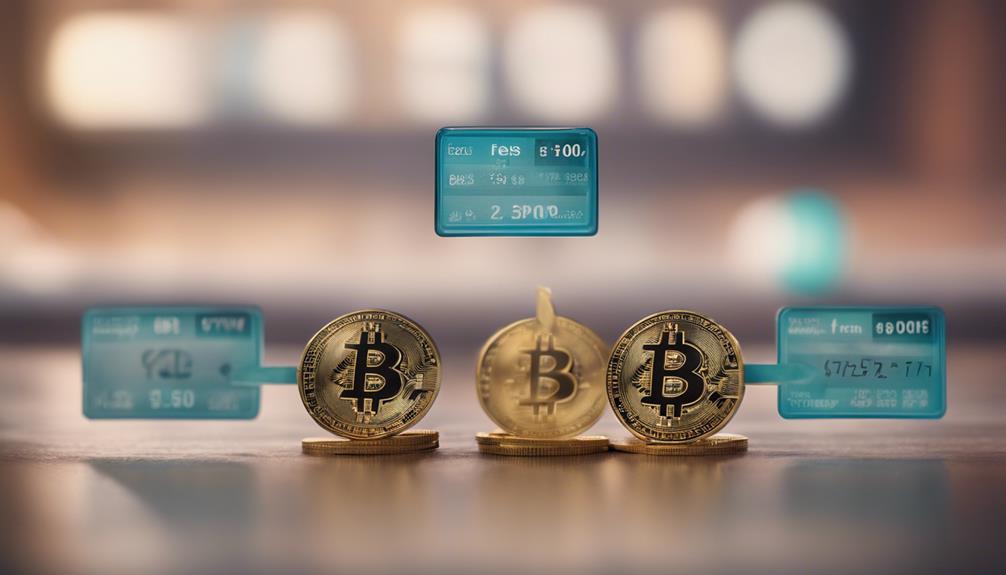
Exploring the world of Bitcoin IRAs requires a fundamental understanding of the various fees and expenses that come into play when considering this investment option. Cryptocurrency IRA fees encompass setup fees, transaction fees, and annual maintenance fees.
Additionally, custodial fees for secure storage of Bitcoin in an IRA and trading fees for buying and selling Bitcoin within the account can contribute to overall Bitcoin IRA expenses. These fees can vary among different custodians and may have an impact on investment returns.
It is essential for investors to comprehend and compare the fees associated with Bitcoin IRAs to make informed decisions. By analyzing the fee structures of different providers and understanding how these fees can affect returns, individuals can better assess the viability of investing in a Bitcoin IRA.
Careful consideration of fees and expenses is vital for maximizing the potential benefits of a Bitcoin IRA and achieving long-term financial goals.
Evaluating Bitcoin IRA Suitability
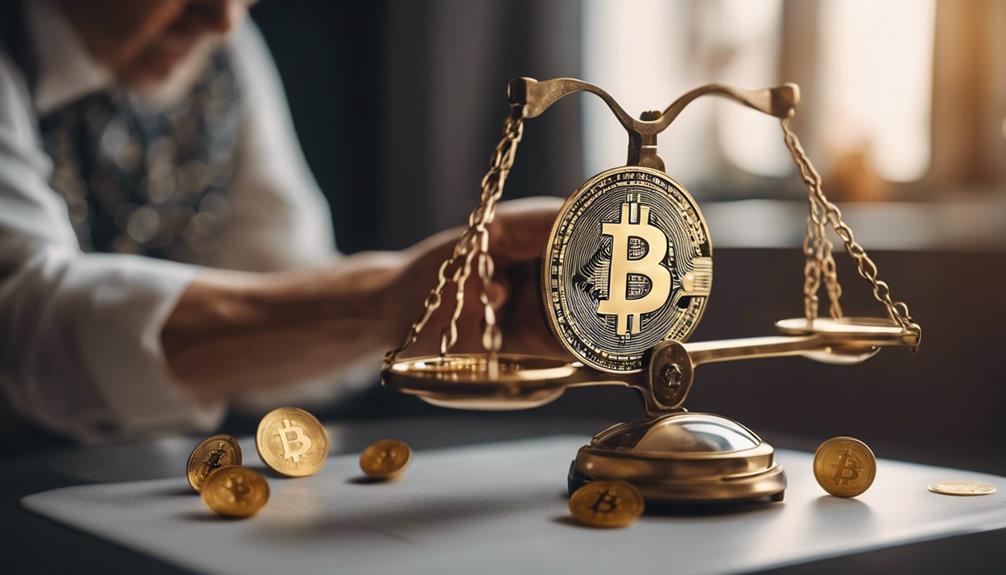
Evaluating the suitability of a Bitcoin IRA for one's financial goals and retirement strategy is an important step in the investment decision-making process. Consider the following points to determine if a Bitcoin IRA aligns with your investment objectives:
- Tax Advantages: Bitcoin IRAs offer tax benefits by enabling investments in Bitcoin within a retirement account, potentially reducing tax liabilities and maximizing returns.
- Diversification Benefits: Holding Bitcoin in an IRA can provide diversification benefits to traditional investment portfolios, spreading risk and enhancing overall portfolio resilience.
- Capital Gains Tax Efficiency: Investing in a Bitcoin IRA can shield capital gains from taxation, allowing for the potential growth of investments in Bitcoin without immediate tax implications. This can lead to significant growth over time as returns compound, bolstering your retirement savings.
Frequently Asked Questions
Is It a Good Idea to Have a Bitcoin Ira?
Investing in a Bitcoin IRA can be a strategic move for some investors. Given the potential for high returns and diversification benefits, it may offer an opportunity to enhance retirement portfolios.
However, it's important to carefully assess the risks and volatility associated with cryptocurrencies. Understanding tax implications and the differences between traditional and Roth Bitcoin IRAs is essential for informed decision-making.
Seeking professional advice can help navigate the complexities of Bitcoin IRAs effectively.
Can I Withdraw Bitcoin From Bitcoin Ira?
In a Bitcoin IRA, you cannot directly withdraw Bitcoin as physical assets. Typically, withdrawals are in cash equivalent to the current Bitcoin value. The primary goal of a Bitcoin IRA is long-term retirement investment, not immediate access to cryptocurrency.
Selling Bitcoin within the IRA may trigger capital gains taxes or penalties, contingent on the IRA type and account age. Consult with your IRA custodian or financial advisor to grasp the specific rules and implications of withdrawing funds from a Bitcoin IRA.
Do You Pay Taxes on Bitcoin Ira?
In a Bitcoin IRA, taxes are typically deferred until withdrawals are made during retirement, akin to traditional IRAs. Roth Bitcoin IRAs, on the other hand, allow for tax-free withdrawals post-retirement, making them advantageous for long-term investors.
Capital gains taxes do not apply when purchasing or selling Bitcoin within a self-directed IRA. Contributions to a Bitcoin IRA may also be tax-deductible, reducing taxable income in the year of contribution.
How Much Does Bitcoin IRA Charge?
Bitcoin IRA charges an average setup fee of $50 to $100, with annual maintenance fees ranging from $100 to $300.
Transaction fees for buying and selling Bitcoin in an IRA can be between 1% to 2%, while custodial fees for holding Bitcoin typically range from 0.5% to 1% annually.
In total, fees for a Bitcoin IRA can add up to approximately 10% of the investment amount over a 10-year period.
Conclusion
To sum up, contemplating investing in a Bitcoin IRA can provide potential growth opportunities, tax benefits, and portfolio diversification. However, it also comes with risks such as volatility and fees to ponder.
It is important to assess the suitability of a Bitcoin IRA based on individual financial goals and risk tolerance. According to a recent survey, 42% of Americans are contemplating including cryptocurrencies in their retirement portfolios, highlighting the growing interest in alternative investment options for retirement savings.
Albert brings a wealth of knowledge and expertise to our writing team. With a background in caregiving and a deep understanding of the challenges faced by caregivers, Albert’s writing resonates with authenticity and empathy. He is committed to delivering high-quality content that empowers and supports caregivers on their journey.
IRA Investing
How to Include Bitcoin in Your IRA Investment
Start investing in Bitcoin through your IRA by finding a specialized custodian – discover how to secure your retirement with cryptocurrency.

To include Bitcoin in your IRA investment, start by finding a custodian specializing in Bitcoin IRAs. Provide necessary personal and banking details for account setup. Confirm that the account types align with your investment goals. Compare custodian fees for cost-effective options. Research thoroughly to find the best fit. Funding methods include transferring funds from existing plans or direct contributions. Understand tax implications for maintaining the tax-deferred status of your funds. Setting up automatic deposits can help maintain a consistent investment strategy. Strategies like rolling over employer-sponsored plans can maximize retirement savings potential. Enhance your knowledge by understanding the tax benefits and implications of Bitcoin IRAs.
Key Takeaways
- Choose a custodian offering Bitcoin IRA services.
- Transfer funds or contribute directly to fund your Bitcoin IRA.
- Understand tax implications and benefits for tax-efficient investing.
- Select cryptocurrencies and diversify your IRA portfolio.
- Comply with contribution limits and regulations to maximize benefits.
Understanding Bitcoin IRA Basics

Understanding the fundamentals of a Bitcoin IRA is essential for individuals looking to diversify their retirement portfolios with cryptocurrency investments. A Bitcoin IRA is a self-directed retirement account specifically tailored for investing in cryptocurrencies like Bitcoin.
By holding Bitcoin within a tax-advantaged IRA structure, investors can potentially benefit from diversification and growth opportunities in the cryptocurrency market. These IRAs can be opened as Traditional IRAs or Roth IRAs, offering similar contribution limits to traditional retirement accounts. One of the key advantages of investing in Bitcoin through a Bitcoin IRA is the potential tax benefits, including the ability to avoid capital gains taxes on trades made within the IRA.
Components of a Bitcoin IRA typically include custodians for safekeeping, secure storage solutions for digital assets, and access to crypto exchanges for trading.
Evaluating IRA Bitcoin Providers

When evaluating including Bitcoin in your IRA investment, it is important to thoroughly assess IRA Bitcoin providers based on factors such as the range of cryptocurrencies offered, transaction fees, minimum investment requirements, and additional features.
Different providers like iTrustCapital offer a wide selection of cryptocurrencies, with over 34 options available for investment. Transaction fees are an important consideration, with providers like BitcoinIRA charging between 0.99% to 4.99%, while others like BitIRA provide no-fee options for certain cryptocurrencies.
Minimum investment requirements vary among providers, such as CoinIRA and Swan Bitcoin, both requiring a minimum investment of $5,000. Additional features can also differentiate providers, including interest-earning opportunities like BitcoinIRA Earn and multi-encryption security like BitIRA offers.
When evaluating IRA Bitcoin providers, it is essential to take into account these aspects to make an informed decision that aligns with your investment goals and preferences.
Benefits of Bitcoin in IRAs

Bitcoin offers several key benefits when included in IRAs.
These include:
- Tax advantages through tax-free reinvestment of gains.
- Providing an opportunity for portfolio diversification beyond traditional assets.
- The potential for lucrative returns due to historical performance trends.
Tax Advantages of Bitcoin
Investing in Bitcoin within an Individual Retirement Account (IRA) presents significant tax advantages that can optimize wealth accumulation and portfolio growth.
Bitcoin investments in IRAs offer tax benefits such as tax-free reinvestment of gains, providing an opportunity for compounding growth. Holding Bitcoin in an IRA not only allows for portfolio diversification but also the potential for lucrative returns.
Additionally, utilizing Bitcoin in IRAs can shield gains from immediate taxation, enhancing long-term wealth accumulation. By deferring capital gains taxes on Bitcoin transactions within the IRA, investors can take advantage of the crypto market's growth while enjoying the tax benefits of retirement accounts.
Diversification in Retirement
Enhancing retirement portfolio diversity through the inclusion of Bitcoin in IRAs offers investors a strategic approach to managing risk and maximizing potential returns. By adding a non-correlated asset like Bitcoin to your retirement portfolio, you can potentially shield your savings from market volatility while aiming for compounding growth. Holding Bitcoin in an IRA also provides tax advantages, as it can help you avoid capital gains taxes when trading within the account. Bitcoin investments in IRAs have shown the potential for significant returns, which can enhance the growth prospects of your retirement savings. When considering diversification in retirement, exploring Bitcoin IRA providers and understanding the benefits of including cryptocurrency in your portfolio can be a prudent strategy.
| Benefits of Bitcoin in IRAs | ||
|---|---|---|
| Diversification | Tax Advantages | Potential Returns |
| Market Volatility | Compounding Growth | Non-Correlated Asset |
Risks of Bitcoin IRA Investments

When considering the inclusion of Bitcoin in an IRA investment strategy, it is important to carefully assess the risks associated with such ventures. Investing in Bitcoin within an IRA comes with various risks that investors should be aware of:
- Extreme Price Volatility: Bitcoin is known for its significant price fluctuations, which can lead to rapid and substantial changes in the value of investments within an IRA.
- Regulatory Uncertainties: The evolving regulatory landscape surrounding cryptocurrencies can impact the value and legality of holding Bitcoin in an IRA, posing potential risks to investors.
- Lack of Insurance Protection: Unlike traditional assets, Bitcoin held in IRAs is not backed by insurance protection. This lack of coverage exposes investors to the risk of potential losses in the event of cyber theft, hacking, or other security breaches.
Understanding these risks is essential for individuals looking to incorporate Bitcoin into their retirement investment portfolios, as it allows for informed decision-making and risk management strategies.
Opening a Bitcoin IRA Account
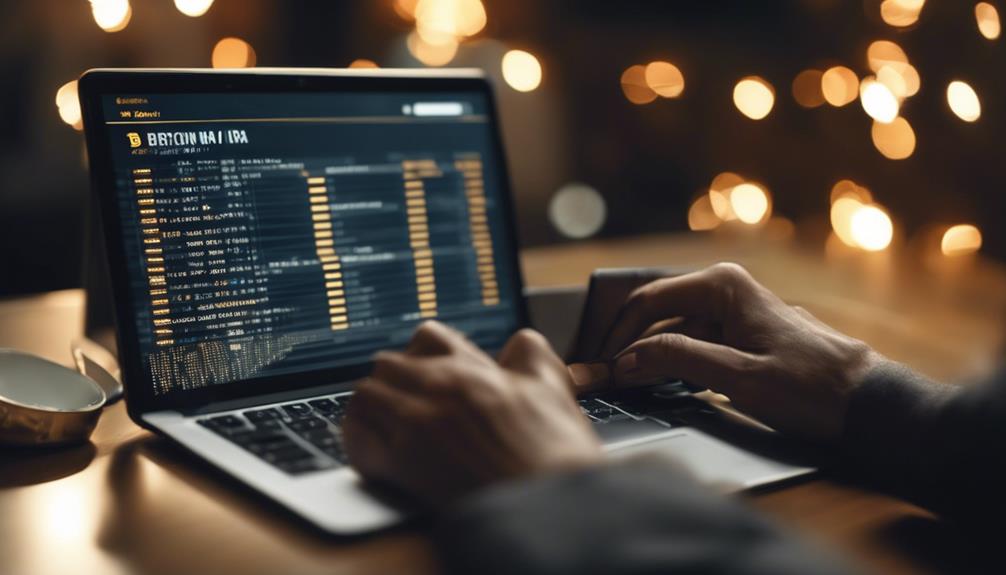
Considering the risks associated with Bitcoin IRA investments, the next step involves the practical process of opening a Bitcoin IRA account.
To begin, locate a custodian specializing in Bitcoin IRAs to set up your self-directed IRA for cryptocurrency investments. You will need to provide personal and banking information as part of the account setup process. It is essential to verify that the account types, exchanges, and cryptocurrencies offered align with your investment goals. Compare fees charged by different custodians to select the most cost-effective option for your Bitcoin IRA.
Thoroughly research various custodians to find the one that best suits your specific Bitcoin IRA needs. By carefully considering these factors and making informed decisions, you can establish a solid foundation for your Bitcoin IRA investment journey.
Remember that the key to successful retirement investing with Bitcoin lies in thorough preparation and strategic decision-making from the outset.
Funding Your Bitcoin IRA

When funding your Bitcoin IRA, you have various options like transferring funds from an employer-sponsored plan or contributing directly with cash or checks.
Setting up your IRA account for Bitcoin investments requires careful consideration of tax implications and benefits to guarantee the tax-deferred status of your funds.
Understanding these funding options is essential for effectively including Bitcoin in your retirement portfolio.
Funding Options for Bitcoin
To invest in Bitcoin through your IRA, you have several funding options available, including cash, checks, and direct deposits. When considering funding your Bitcoin IRA, here are some key options to explore:
- Cash: You can use liquid funds from your savings or other sources to invest in Bitcoin within your IRA.
- Checks: Writing a check allows you to transfer funds from your bank account to your Bitcoin IRA for investment purposes.
- Direct Deposits: Setting up automatic deposits into your Bitcoin IRA guarantees a consistent investment strategy and helps you capitalize on market opportunities efficiently.
These options, combined with strategies like rolling over employer-sponsored plans or transferring existing retirement accounts, can help you maximize your retirement savings potential while benefiting from tax-deferred growth.
Setting up IRA Account
Before initiating your Bitcoin IRA investment, establishing the IRA account is an important initial step that involves funding your chosen Bitcoin investment vehicle. When setting up your Bitcoin IRA, make sure compliance with contribution limits, which are $7,000 for 2024 ($8,000 for individuals aged 50 and older). Select a secure and reputable custodian to safeguard your investments. Fund your Bitcoin IRA through direct deposits, checks, or other acceptable means. It is essential to understand the tax implications and benefits associated with funding and managing a Bitcoin IRA to make informed decisions. Below is a table summarizing key points to consider when setting up your Bitcoin IRA account:
| Aspect | Description |
|---|---|
| Contribution Limits | $7,000 for 2024 ($8,000 for individuals aged 50 and older) |
| Custodian Selection | Choose a secure and reputable custodian for your Bitcoin IRA |
| Funding Methods | Direct deposits, checks, or other acceptable means of funding |
| Tax Implications | Understand the tax implications and benefits of a Bitcoin IRA |
Tax Implications and Benefits
Understanding the tax implications and benefits associated with funding your Bitcoin IRA is essential for making informed investment decisions and optimizing potential returns. When considering a Bitcoin IRA for retirement savings, here are key tax-related points to keep in mind:
- Contributions to Traditional IRAs are tax-deductible, offering potential tax savings.
- Roth IRAs funded with post-tax dollars can provide tax-free growth and withdrawals, including gains from Bitcoin investments.
- Tax benefits in a Bitcoin IRA can include deferring capital gains taxes on crypto trades and transactions within the account.
Managing Cryptocurrency Allocation in IRAs

Managing cryptocurrency allocation in IRAs requires a strategic approach tailored to individual risk profiles and investment objectives. When considering Bitcoin allocation within an IRA, it's important to determine the percentage based on your risk tolerance and investment goals. Utilizing a self-directed IRA custodian that permits cryptocurrency investments can help manage this allocation effectively.
Regularly reviewing and adjusting your Bitcoin allocation within the IRA is vital to align with market conditions and your overall investment strategy. Secure storage solutions and reputable crypto exchanges should be used for buying, selling, and storing Bitcoin within the IRA.
Staying informed about regulatory changes and tax implications concerning holding Bitcoin in an IRA is necessary for compliance and optimizing your investment strategy. By staying proactive and informed, investors can navigate the complexities of cryptocurrency allocation in IRAs while working towards their retirement goals.
Tax Implications of Bitcoin IRAs
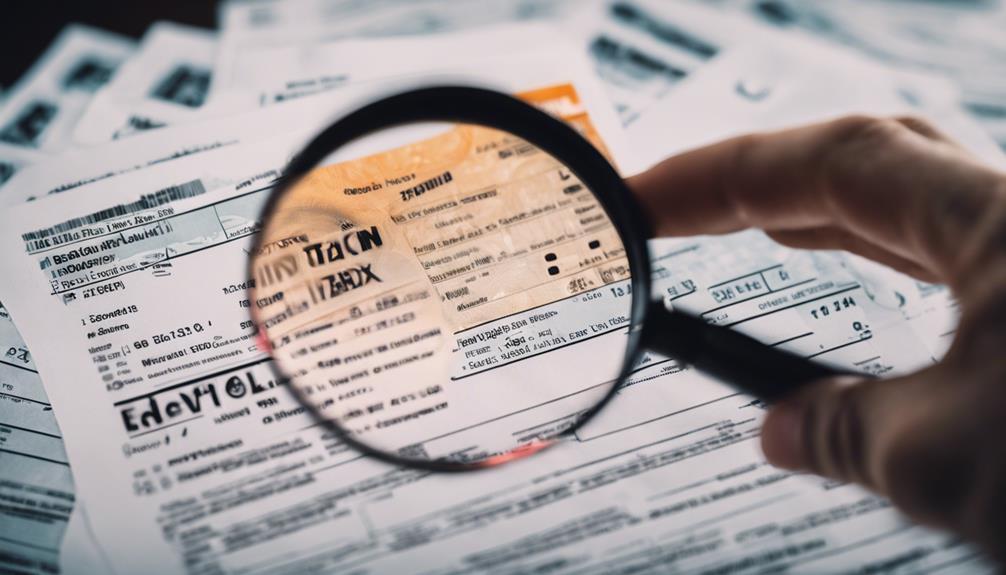
When considering the tax implications of including Bitcoin in your IRA investment, it is important to understand the potential advantages and complexities that come with this form of diversification. Here are some key points to keep in mind:
- Tax Advantages: Investing in Bitcoin through a self-directed IRA can offer tax benefits, such as deferring capital gains taxes on trades made within the account.
- Pre-Tax Dollars and Tax Savings: Contributions to a Bitcoin IRA are typically made with pre-tax dollars, allowing for potential tax savings and growth of investments.
- Withdrawals and Tax Treatment: Withdrawals from a Bitcoin IRA can be subject to different tax treatment depending on whether it's a Traditional or Roth IRA.
Proper record-keeping of transactions within a Bitcoin IRA is essential for accurate tax reporting and compliance with IRS regulations. Understanding the tax implications of holding Bitcoin in an IRA is vital to maximize potential benefits and avoid unexpected tax consequences.
Frequently Asked Questions
How Do I Put Bitcoins Into My Ira?
To put bitcoins into your IRA, open a self-directed IRA that permits cryptocurrency investments.
Select a reputable custodian supporting Bitcoin in IRAs. Transfer funds from your traditional IRA or 401(k) to the new Bitcoin IRA.
Make Bitcoin purchases through the custodian's platform and securely store them in your IRA.
Guarantee compliance with IRS regulations and maintain accurate records of your Bitcoin holdings in your IRA for a successful investment strategy.
Do You Have to Report Crypto in an Ira?
Yes, crypto holdings in an IRA must be reported to the IRS, similar to other investments. Failure to disclose can lead to penalties.
Accurate reporting guarantees compliance with tax laws. To report crypto in an IRA correctly, consult a tax professional or financial advisor.
Understanding reporting requirements is crucial for legal compliance and financial transparency. Be proactive in adhering to regulations to avoid potential issues with the IRS.
What IRA Allows Crypto?
Self-directed IRAs are tailored for alternative assets like Bitcoin, offering the flexibility to include cryptocurrencies in retirement accounts. Companies such as BitcoinIRA, iTrustCapital, BitIRA, and CoinIRA provide platforms for integrating Bitcoin into IRAs.
Traditional IRA providers typically do not allow direct cryptocurrency holdings, but self-directed IRAs offer this option. Cryptocurrencies, including Bitcoin, are considered property by the IRS, enabling their inclusion in certain IRAs through specific providers.
Can You Hold Bitcoin in a Self-Directed Ira?
Yes, you can hold Bitcoin in a self-directed IRA.
Self-directed IRAs provide the flexibility to invest in various assets beyond traditional options like stocks and bonds.
By including Bitcoin in your self-directed IRA, you can diversify your retirement portfolio and potentially benefit from the growth of cryptocurrency.
It's essential to understand the risks and regulations associated with holding Bitcoin in an IRA to make informed investment decisions.
Conclusion
To sum up, investing in Bitcoin within an IRA can provide diversification and potential growth opportunities for your retirement portfolio. However, it is essential to carefully evaluate providers, understand the risks involved, and consider tax implications before making a decision.
By following the steps outlined in this article, you can confidently incorporate Bitcoin into your IRA investment strategy. Isn't it worth considering the potential benefits of adding Bitcoin to your retirement portfolio?
Albert brings a wealth of knowledge and expertise to our writing team. With a background in caregiving and a deep understanding of the challenges faced by caregivers, Albert’s writing resonates with authenticity and empathy. He is committed to delivering high-quality content that empowers and supports caregivers on their journey.
IRA Investing
How to Set Up a Bitcoin IRA in 5 Steps
Dive into the world of Bitcoin IRAs by choosing a reputable custodian with secure storage options – your retirement strategy might just get a crypto boost!
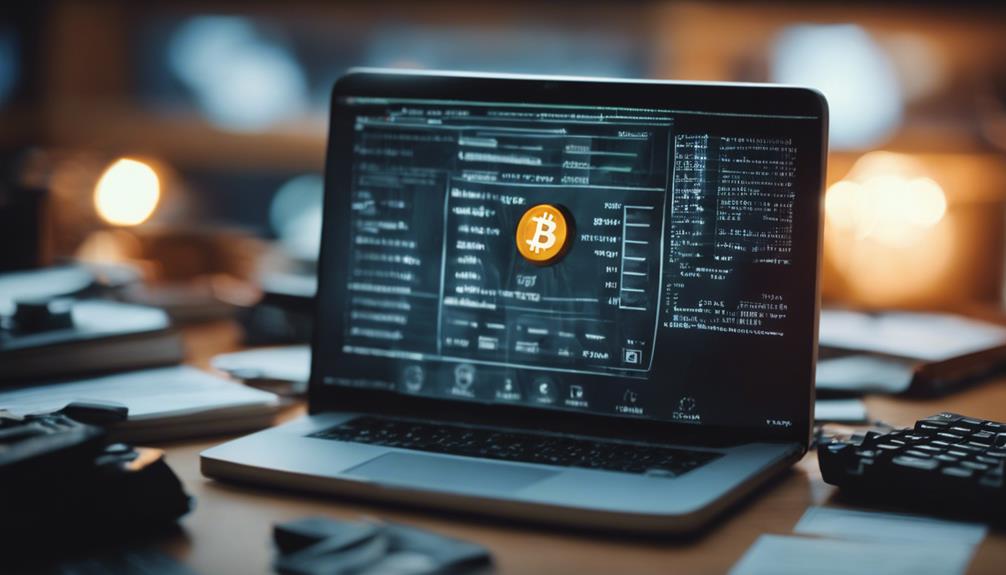
To set up a Bitcoin IRA in five steps, begin by choosing a reputable custodian like BitIRA or BitcoinIRA with secure storage options. Provide personal details, verify your identity, and decide between a Traditional or Roth IRA. Fund your account through rollovers or direct contributions, considering tax implications. Purchase Bitcoin within your IRA, potentially growing retirement funds through cryptocurrency. Secure your assets by selecting a custodian with strong security measures and utilizing cold storage solutions. Diversify your retirement portfolio and explore the world of cryptocurrency investments for future financial growth.
Key Takeaways
- Choose a reputable custodian like BitIRA or BitcoinIRA.
- Provide personal information and open the account.
- Fund your Bitcoin IRA through rollovers or direct contributions.
- Purchase Bitcoin within your IRA account.
- Secure your Bitcoin IRA assets with reputable custodians and secure storage options.
Choosing a Reputable Bitcoin IRA Custodian
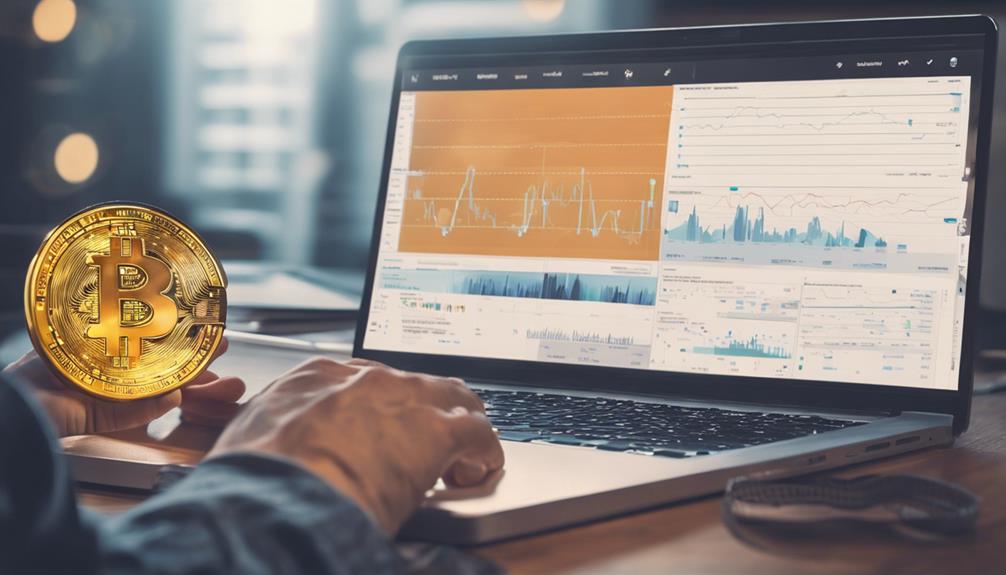
When choosing a custodian for your Bitcoin IRA, it is important to prioritize established firms like BitIRA, BitcoinIRA, or Noble Bitcoin with strong reputations in managing such investments. These custodians offer secure storage solutions to safeguard your Bitcoin holdings, ensuring they are protected from potential cyber threats or theft.
Additionally, evaluating custodian fees, reputation, and customer service is vital to establish a reliable partnership for your retirement account. Selecting a custodian that provides a wide range of investment options and supports cryptocurrency trading can enhance the growth potential of your IRA.
Additionally, opting for custodians that offer educational resources and guidance on managing a Bitcoin IRA effectively can empower you to make informed investment decisions. By considering these factors when choosing a custodian for your Bitcoin IRA, you can set a solid foundation for a secure and prosperous retirement investment plan.
Providing Personal Information and Opening Account
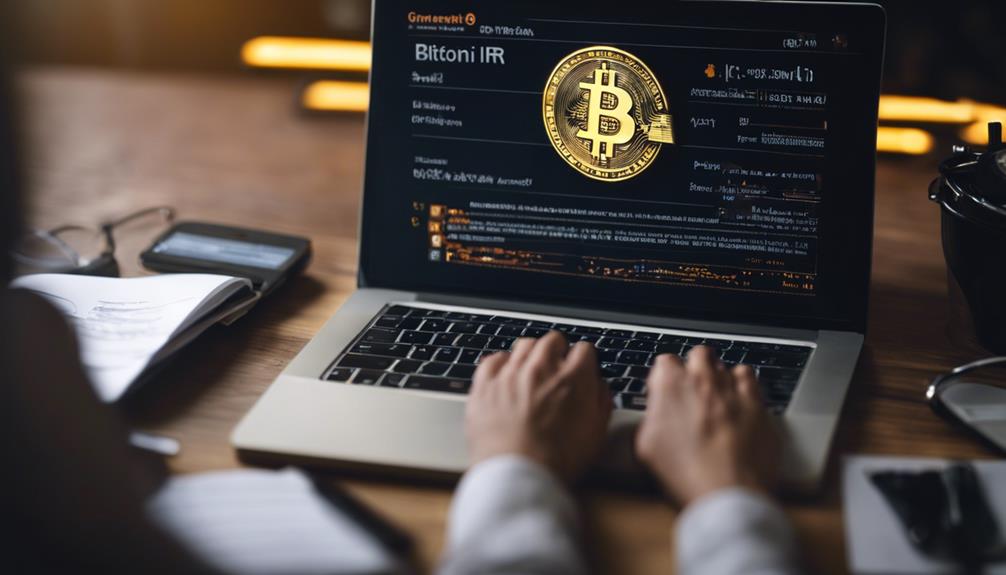
To initiate the process of setting up a Bitcoin IRA, individuals are required to furnish essential personal details such as their name, address, and social security number. This information is vital for establishing the account and guaranteeing compliance with regulations. Additionally, verifying one's identity through documents like a driver's license or passport may be necessary. When opening a Bitcoin IRA, individuals have the option to choose between a Traditional or Roth IRA, depending on their tax preferences and financial goals. It is recommended to select a reputable custodian such as BitIRA or BitcoinIRA to secure the storage of assets. Once the account is set up and verified, individuals can fund the account through a rollover from an existing retirement account or through a direct contribution. This initial step sets the foundation for investing in Bitcoin within the IRA structure.
| Key Steps | Details |
|---|---|
| Provide Personal Info | Name, address, social security number |
| Verify Identity | Driver's license or passport |
| Choose IRA Type | Traditional or Roth IRA |
| Select Reputable Custodian | BitIRA or BitcoinIRA |
Funding Your Bitcoin IRA Account
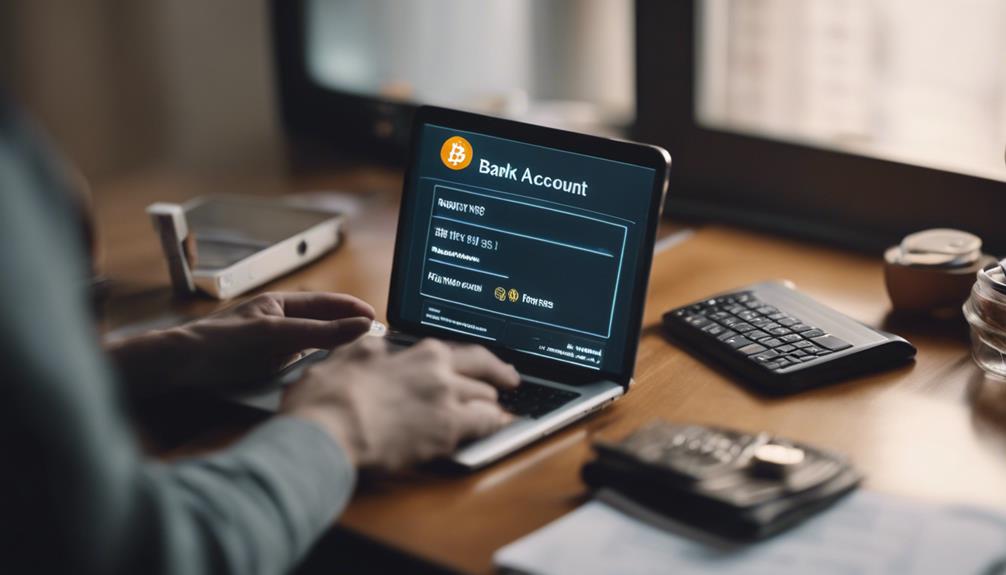
Funding a Bitcoin IRA account involves transferring funds from existing retirement accounts or making direct contributions to facilitate investments in cryptocurrencies. You can fund your Bitcoin IRA through rollovers from traditional IRAs, 401(k)s, or other retirement accounts.
Direct contributions are also an option, ensuring compliance with IRA contribution limits to avoid penalties. When funding your Bitcoin IRA, consider the tax implications and potential advantages, such as capital gains tax deferral.
It is essential to use secure and regulated platforms for transferring funds to maintain the security of your assets. By funding your Bitcoin IRA strategically, you can take advantage of the growing potential of Bitcoin through an IRA while adhering to retirement account regulations.
It is advisable to seek guidance from financial advisors or tax professionals to understand the best approach to fund your account and maximize your investment opportunities within the domain of cryptocurrency and retirement planning.
Purchasing Bitcoin for Your IRA

After successfully funding your Bitcoin IRA account through rollovers or direct contributions, the next step is to select a reputable custodian from options like BitIRA, BitcoinIRA, or Noble Bitcoin to proceed with purchasing Bitcoin for your IRA.
These Bitcoin IRA custodians offer secure storage options for your cryptocurrencies. Open an account with your chosen custodian by providing personal information and completing the necessary paperwork.
Once your Bitcoin IRA is funded, you can buy Bitcoin within your IRA account. This investment allows you to trade, sell, and potentially grow your retirement funds through cryptocurrency.
By investing in Bitcoin through a self-directed IRA account, you can diversify your retirement portfolio and take advantage of the potential growth in the cryptocurrency market.
Make sure you follow the guidelines set by your chosen company on how to invest and manage your Bitcoin holdings within your IRA for a secure and profitable retirement strategy.
Securing Your Bitcoin IRA Assets

When safeguarding your Bitcoin IRA assets, selecting a reputable custodian with secure storage options is essential for ensuring the protection of your digital investments.
Utilizing cold storage solutions or hardware wallets can offer an additional layer of security for your digital assets.
Implementing strong cybersecurity measures, such as two-factor authentication, further enhances the safety of your Bitcoin IRA.
It is vital to regularly monitor and review the security protocols of your custodian to guarantee asset protection against potential threats.
Staying informed about best practices for securing your Bitcoin IRA assets is pivotal in mitigating risks associated with digital investments.
By following these steps and remaining vigilant in safeguarding your assets, you can help secure your retirement savings for the long term.
Frequently Asked Questions
How to Set up Bitcoin Ira?
Setting up a Bitcoin IRA involves several key steps:
- Selecting a reputable custodian.
- Providing personal information.
- Funding your account through rollovers or direct contributions.
Once your account is funded, you can:
- Purchase Bitcoin to start investing in cryptocurrencies.
- Ensure safe storage of your Bitcoin with secure options provided by the custodian.
It's important to:
- Stay informed about tax implications.
- Understand the benefits of investing in a Bitcoin IRA to make informed decisions for your retirement savings.
How Much Does It Cost to Set up a Bitcoin Ira?
Setting up a Bitcoin IRA incurs costs that encompass a one-time account establishment fee (approximately $50) and an annual account fee (around $295) managed by the custodian. Transaction fees for buying and selling Bitcoin within the IRA may range from 0.50% per trade. Understanding these fees aids in evaluating the total expenses involved in managing and trading cryptocurrencies within the account.
Familiarity with the fee structure assists in making informed decisions about the account's overall cost.
Is It a Good Idea to Have a Bitcoin Ira?
Investing in a Bitcoin IRA can be a strategic move for diversifying your retirement portfolio. It offers potential tax advantages, protection against market volatility, and the opportunity to tap into a growing asset class with high returns.
However, like any investment, it carries risks. It's recommended to weigh the advantages and disadvantages, conduct proper research, and consider consulting with a financial advisor to determine if a Bitcoin IRA aligns with your long-term financial goals.
Can You Buy Bitcoin Ira?
Yes, you can buy Bitcoin in an IRA through a specialized account known as a Bitcoin IRA. This investment avenue offers tax advantages and diversification benefits within a retirement account.
By setting up a Bitcoin IRA, investors can potentially benefit from the growth of Bitcoin while deferring taxes on gains, providing a secure way to hold and grow Bitcoin investments for retirement.
It's a strategic option for those looking to expand their retirement portfolio with cryptocurrency.
Conclusion
To sum up, setting up a Bitcoin IRA involves the following steps:
- Selecting a reputable custodian
- Providing personal information
- Funding your account
- Purchasing Bitcoin
- Securing your assets
By following these steps, you can safely invest in Bitcoin for your retirement.
Remember to conduct thorough research and seek professional advice to make informed decisions. As the saying goes, "Knowledge is power," so empower yourself with the necessary information to navigate the world of Bitcoin IRAs confidently.
Albert brings a wealth of knowledge and expertise to our writing team. With a background in caregiving and a deep understanding of the challenges faced by caregivers, Albert’s writing resonates with authenticity and empathy. He is committed to delivering high-quality content that empowers and supports caregivers on their journey.
-

 Dementia Care2 weeks ago
Dementia Care2 weeks agoHow Gabapentin Affects Dementia: A Comprehensive Guide
-

 Dementia Care2 months ago
Dementia Care2 months agoUnderstanding the Stages of Vascular Dementia: A Visual Chart Guide
-

 Dementia Care2 weeks ago
Dementia Care2 weeks ago5 Things You Need to Know About Jack Nicholson’s Dementia
-

 Medication Management1 month ago
Medication Management1 month agoGabapentin Side Effects: Memory Loss Concerns?
-

 Dementia Care2 months ago
Dementia Care2 months agoUnderstanding Narcissism and Dementia: A How-To Guide
-

 Palliative Care for Parkinson's2 weeks ago
Palliative Care for Parkinson's2 weeks agoPalliative Care for Parkinson’s: A New Hope for Patients”
-

 Dementia Care2 weeks ago
Dementia Care2 weeks ago10 Engaging Dementia Games for Cognitive Stimulation
-

 Dementia Care2 months ago
Dementia Care2 months agoHow to Deal with a Parent’s Dementia: A Practical Guide

















